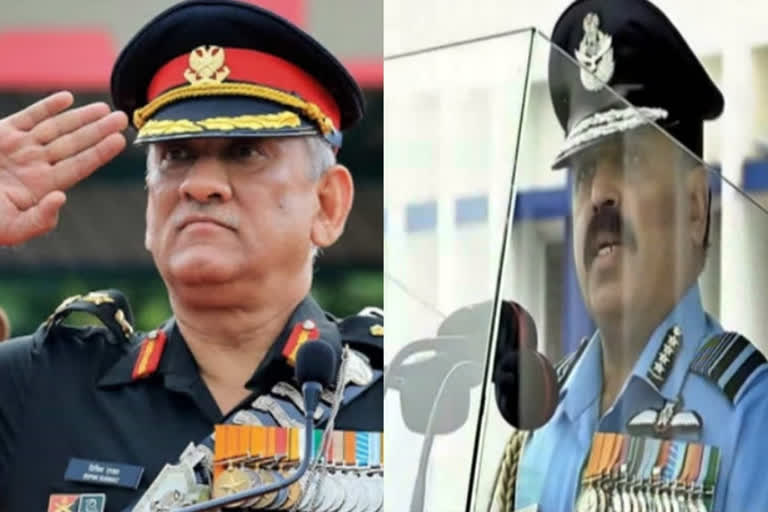New Delhi: It has been a topic talked about in hushed whispers for some time now. That India’s biggest military reform effort of trying to establish integrated Theatre commands has encountered its first major hiccup with the Indian Air Force (IAF) disagreeing to certain proposals on how the process was to be carried ahead. But on Friday, the contentious discourse may have spilled out into the open when IAF chief RKS Bhadauria expressed his disagreement to what the Chief of Defence Staff (CDS) General Bipin Rawat had said in an interview to a media house just before the IAF’s chief’s interview.
Asked on whether he agreed to the IAF being described by the CDS as one with a “supporting role”, Air Chief Marshal Bhadauria said: “It (IAF) is not a supporting role at all. Airpower has a huge role to play. In any of the integrated battle area, it (air force role) is not about support alone and there are a whole lot of things that go into any airpower air plan that is made and those are issues…(being deliberated in-house)”. In an interview earlier in the day, General Rawat had remarked that the IAF should not be having any reservations over the setting up of a single air defence command which is part of the proposals and that the IAF works on a supporting role for the fighting forces. “The Air Force is not just responsible for air defence. It has got another charter. It has got a charter of providing close air support to land forces when they undertake operations and for offensive air operations in case you go into the adversary's territory,” he had said.
Read: General Rawat visits forward areas along LAC in central sector in Himachal
However, saying that the IAF was fully behind the move to set up Theatre commands, the IAF chief said: “Establishing integrated Theatre commands are much more complex. We are for establishing integrated Theatre commands but the issue that we have raised in our internal discussions is about how we should do it. We must do it right. It is the most important reform that has an impact on warfighting…There are some issues that we have been internally discussing. These are all issues that have to be deliberated upon to get it right.” Under the watch of the CDS, the Indian military is undertaking a huge modernization and reforms effort by doing away with the functional commands system and replacing it with Theatre command architecture. At the basic level, it means that a single commander in a designated zone will command all the assets and resources of all forces be it from the army, the navy or the air force stationed in that zone.
Since 2015, China has reorganized its military along Theatre command lines by restructuring its seven military regions into five geographical-operational theatre commands. On the other hand, the United State’s six unified theatre commands control the global operations. In contrast, India has 17 commands based on operational and geographical requirements—six operational army commands and one training command, three navy commands, five IAF operational commands besides a Training Command and a Maintenance Command. This excludes the tri-services command located at the Andaman and Nicobar Islands and the SFC (Strategic Forces Command).
Drone Strikes
The IAF chief also stated that the June 27 drone strikes in a Jammu IAF airbase was an act of terror that targeted key military assets. “What happened at Jammu was essentially a terrorist act which attempted to target our assets there. The attempt failed of course. The assets were not damaged”. Following the Jammu attack, there have been several drone ‘sightings’ in area. Interestingly, it has come to light that a drone was spotted over the Indian High Commission complex in Islamabad last week.
“A drone was spotted over the premises of the Indian High Commission in Islamabad on June 26. This has been taken up officially with the government of Pakistan. We expect Pakistan to investigate the incident and prevent recurrence of such breach of security,” External Affairs Ministry Spokesperson Arindam Bagchi said at a media briefing on Friday. On Thursday, Army chief General MM Naravane had also said that drones and their easy accessibility has increased the complexity of security challenges from both state and state-sponsored actors.
Read: Defence Minister to get detailed presentation on Jammu drone attack today



